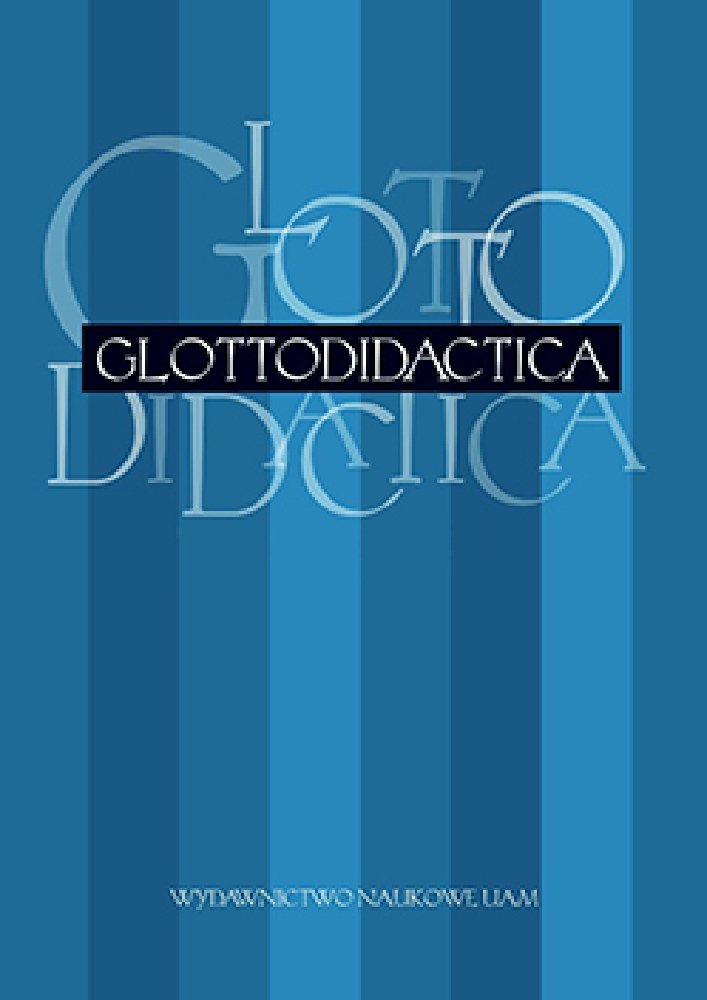Abstract
-References
Bransford, J.D., Barclay, J.R., Franks, J.J., 1972. Sentence memory: A constructive vs. interactive approach. In: Cognitive Psychology 3, 193–209.
Friederici, A.D., Kotz, S.A., 2003. The brain basis of syntactic processes: functional imaging and lesion studies. In: Neuroimage 20, Suppl. 1, 8–17.
Gadenne, V., 1996. Bewusstsein, Kognition und Gehirn. Einführung in die Psychologie des Bewusstseins. Bern: Verlag Hans Huber.
Kupsch-Losereit, S., 1997. Übersetzen: ein integrativ-konstruktiver Verstehens- und Produktionsprozess. In: Drescher, H.W. (Hrsg.). Transfer. Übersetzen – Dolmetschen – Interkulturalität. Frankfurt: Peter Lang.
Legutko-Marszałek, I., 2006. Zum Status eines mentalen Lexikons bei einem bilingualen Sprecher. In: Glottodidactica XXXII. An International Journal of Applied Linguistics, 59–71.
Legutko-Marszałek, I., 2007. Die Unterscheidung zwischen Bedeutungen und Begriffen in Anbetracht des Bilingualismus. In: Studia Germanica Gedanensia, 163–168.
Legutko-Marszałek, I., 2010. Der Zugriff auf lexikalische Einheiten und die Aktivierung von sprachlichen Informationen im Prozess der Sprachrezeption und Sprachproduktion bei Bilingualen. In: Studia Niemcoznawcze XLV, 525–535.
Rickheit, G., Strohner, H., 2003. Inferenzen. In: Rickheit, G., Herrmann Th., Deutsch, W., (Hrsg.) Psycholinguistik. Ein internationales Handbuch. Berlin – New York: Walter de Gruyter.
Scherfer, P., 1997. Überlegungen zu einer Theorie des Vokabellernens und -lehrens. In: Börner, W., Vogel, K. (Hrsg.). Kognitive Linguistik und Fremdsprachenerwerb. Tübingen: Gunter Narr Verlag.
Squire, L., 1993. The organization of declarative and non-declarative memory. In: Ono T., Squire, L., Raichle, M.F., Perrett D., Fukuda, J. (Hrsg.). Brain mechanism of perception and memory: From neuron to behavior. New York: McGraw-Hill.
License
Authors
Authors of texts accepted for publication in Glottodidactica are required to complete, sign and return to the Editorial team’s office the Agreement for granting a royalty-free license to works with a commitment to grant a CC sub-license.
Under the agreement, the authors of the texts published in Glottodidactica grant Adam Mickiewicz University in Poznań a non-exclusive, royalty-free license and authorize the use of Attribution-NoDerivatives 4.0 International (CC BY-ND 4.0) Creative Commons sub-license.
The authors retain the right to the free disposal of the work.
Users
Interested Internet users are entitled to use works that have been published in Glottodidactica since 2016, under the following conditions:
▪ attribution – obligation to provide, together with the distributed work, information about the authorship, title, source (link to the original work, DOI) and the license itself.
▪ no derivatives – the work must be preserved in its original form. Without the author's consent, it is not possible to distribute the modified work in the form of translations, publications, etc.
Copyrights are reserved for all texts published before 2016.
Miscellaneous
Adam Mickiewicz University in Poznań retains the property right as a whole (layout, graphic form, title, cover design, logo etc.).
Privacy statement
The names and email addresses published on this journal site will be used exclusively for the purposes declared by this journal and cannot be used for any other purpose or by any other party.




